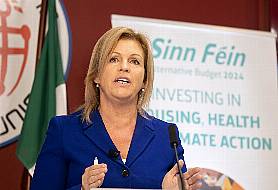€600 million has been allocated for the 2020 Winter Initiative to ensure that the health service has the capacity and resources to deal with the "challenging" coming months, which HSE CEO Paul Reid described as an "unprecedented investment in the healthcare services."
The plan will aim to boost capacity in hospitals and the community against the backdrop of the pandemic. The HSE is promising hundreds of additional hospital beds as part of the plan, along with the hiring of extra hospital staff.
Mr Reid said the core principals of the plan revolved around protecting the public, patients and staff against Covid-19 "to the greatest extent possible" while supporting both Covid and non-Covid services throughout the winter.
Key initiatives within the Winter Plan include:
- Additional acute bed capacity of 900, along with HSE-procured private bed capacity and intermediate care beds.
- Additional home support packages and investment in community services to reduce pressure on the hospital system.
- Additional community healthcare networks and specialist teams, including for older people and those with a chronic disease.
- E-health and remote health clinics.
- An expanded flu vaccination programme to reduce stress on the country’s healthcare service.
Speaking at the launch of the plan, TD Mary Butler, Minister for Mental Health and Older People, said the €600 million investment by Government demonstrated how seriously it viewed the challenges that “we can all see coming towards us” over the winter months.
Mr Reid said: “This winter is going to be more difficult than any we’ve ever faced before. We are living with Covid-19, we are living differently, however we have planned differently and we have to take confidence in our Winter Plan."
"I am asking the public to follow the public health advice, the worst thing we can do is to get complacent. I am also asking those within the priority groups to ensure they get the flu vaccine and give themselves the best opportunity to stay well this winter.”
Critical care beds
Mr Reid said 2020 would see a total investment of €900 million in personal protective equipment, with a “strong projected supply” for most items throughout the winter, adding that sourcing was complete through to March 2021.
He said Ireland’s intensive care capacity had started from a low benchmark, from 225 beds open and funded at the beginning of the pandemic, now up to 282 beds with trained staff.
Mr Reid said the HSE expected to bring the number of intensive care beds up a total of 30 per cent from where it was in February of this year as part of the winter plan.
Anne O’Connor, HSE Chief Operations Officer, said the number of critical care beds was “hard to pin down”, however, 17 additional beds would be made available as part of the Winter Plan.
Ms O’Connor said an additional 42 beds were “nearly” all open, following Covid-19 funding over the past six months.
Ms O’Connor said a “community first” approach to the delivery of care will be central in “delivering safe, efficient and effective services through winter and beyond.”
“For the forthcoming winter period, we are focusing on the resumption of health services, while preparing for the expected pressures associated with winter and delivering services in the context of the continuing presence of Covid-19,” she said.
The health service is entering a challenging winter period, in the midst of a global pandemic.
At the beginning of the month, Health Minister Stephen Donnelly announced winter measures would include the extension of GP special payments to ensure Covid-19 consultations and testing remains free of charge to everyone.
Minister Donnelly said the winter would be a time requiring collective effort: “The health service is entering a challenging winter period, in the midst of a global pandemic. It’s important that we make every effort collectively to limit the impact on the health service over the coming months.”
The Government’s new "Living with Covid-19" plan also sets out healthcare improvements to be implemented over the coming months, including more healthcare hours, community assessment hubs and additional beds in critical care units and hospital wards.
Critical cancer services, such as screenings and care, will also be supported while there will be a national plan to increase mental health supports.







